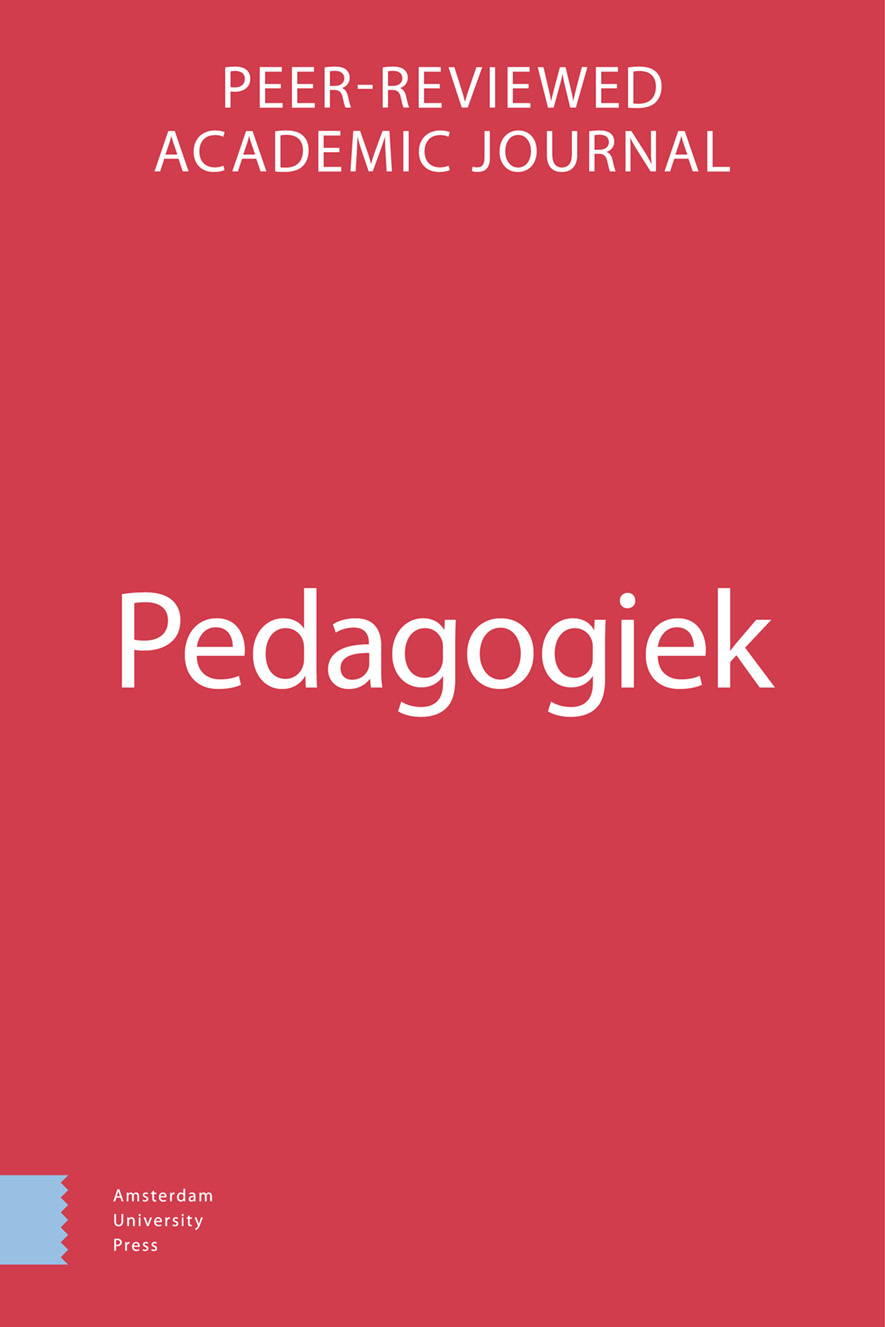- Home
- A-Z Publications
- Pedagogiek
- Previous Issues
- Volume 38, Issue 1, 2018
Pedagogiek - Volume 38, Issue 1, 2018
Volume 38, Issue 1, 2018
-
-
De rol van nationaal beleid, schoolbeleid en leraren in de implementatie van 21e eeuwse vaardigheden
More LessAuthors: Karmijn Van De Oudeweetering & Joke VoogtAbstractThe role of national policy, school policy and teachers in the implementation of 21st century skills: Teachers’ perspectives
Despite the emphasis on 21st century skills in empirical studies and Dutch policy recommendations, it has been shown that these skills are not systematically implemented in primary and secondary schools in the Netherlands. To understand the gap between policy and practice, concerns in both fields need to be considered. However, research has taken little notice of teachers’ conceptualizations and motivations with regards to 21st century skills and their perspectives towards national policy, school policies and their daily practice. This study aimed to identify factors on the micro- meso- and macro level that may, according to teachers, play a role in the implementation of 21st century skills. Nine teachers in primary and secondary education with experience with the implementation of 21st century skills were interviewed. Qualitative analyses were adopted to examine the prevalence of existing and new ideas about influential factors. Results indicated that the rationale for and conceptualization of 21st century skills partly explained the educational innovation. Factors in national policy, including clear guidelines, adjusted regulations and larger budgets for school resources, could support school policies. In turn, school policy factors like curricula, assessments, professionalization programs, infrastructure and leadership could help to prepare teachers to achieve the relevant knowledge, beliefs, self-efficacy and collaboration practices. Hence, the synergy between factors on the national- school- and teacher-level seemed crucial for the implementation of 21st century skills.
-
-
-
Ouders van basisschoolleerlingen in Zuid-Limburg over ouderbetrokkenheid
More LessAuthors: Hélène Leenders, Carla Haelermans, Johan de Jong & Mélanie MonfranceAbstractParents’ Perceptions of Parent Teacher Relationship Practices in Dutch Primary Schools – an exploratory pilot study
This exploratory study focuses on parents’ perceptions of parental involvement and parent-teacher relationship practices between different types of schools. Using a questionnaire, we compare parents’ perceptions of two special education schools, two schools serving low SES-children, and two mainstream primary education schools in the southern part of the Netherlands. The theoretical framework is based on Epstein’s and Hoover-Dempsey and Sandler’s models of parental involvement. The results illustrate that parents and teachers of students in special education and low SES schools are more accustomed to align mutual tasks and expectations, in contrast to parents of children in mainstream schools, and that this is valued highly by these parents. Furthermore, in low SES schools parents and teachers are more used to interact with eachother, and parents feel strongly supported in their home-based learning. Regarding inclusive education, mainstream schools may learn from low SES schools and schools for special education.
-
-
-
Inzetten op empowerment van ouders in de gedwongen jeugdzorg
More LessAuthors: Nienke Smulders, Erna Hooghiemstra & Chijs van NieuwenhuizenAbstractEncouraging parental empowerment in child protection services
In youth care, parental empowerment is increasingly being seen as an efficient way to improve family functioning. In child protection services, parents may perceive the power differences and strains between them and youth professionals as an obstacle to work effectively on their empowerment. In this article, we conducted a literature review to explore what is known about strengthening parental empowerment in child protection services. Between March 2015 and February 2016, (inter)national scientific literature was searched concerning factors influencing parental empowerment in child protection services. The relevance of studies was established by using in- and exclusion criteria. Factors influencing parental empowerment can be found on the level of the client (for instance, family functioning and the social network) and on the level of the professional (relational components and participation components). This literature review is a first step towards knowledge about what can be done to strengthen empowerment of parents in child protection services. Since few studies have focused on parents in child protection services, more research concerning parental empowerment in this specific context has to be done.
-
Most Read This Month

Most Cited Most Cited RSS feed
-
-
Tijd voor pedagogiek
Author: Gert Biesta
-
- More Less

